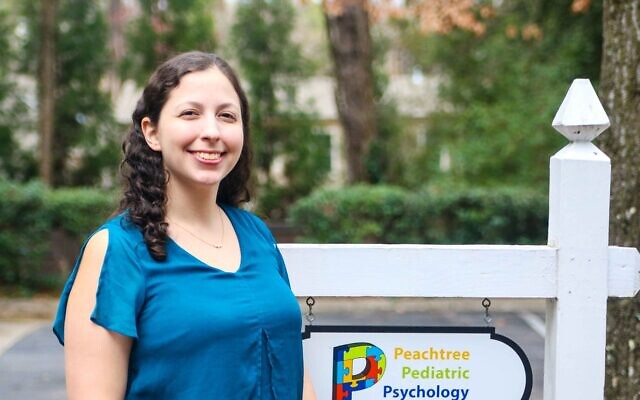Cohen’s Testing Helps Evaluate Students
Atlanta native Dr. Avital Cohen shares the details of finding strategies for kids based on their strengths and weaknesses.
After 37 years with the Atlanta Journal-Constitution and now with the AJT, , Jaffe’s focus is lifestyle, art, dining, fashion, and community events with emphasis on Jewish movers and shakers.

Schools may require tests for acceptance, or parents may want to better understand their child’s strengths and weaknesses and schedule an evaluation with a licensed professional tester. The good news is that specialists are becoming better at early diagnoses; the flipside is that disorders appear to be so prevalent.
Native Atlantan Dr. Avital Cohen helps negotiate the maze of attention deficit disorder, autism, ADHD, learning styles, and intellectual ability, along with school evaluations and testing gifted children. She also helps with kindergarten readiness and adult testing for college accommodations and guardianships.
Some private schools use testing as one piece of information amongst many, including teacher recommendations and direct observations. Schools that require testing are trying to make sure a student’s profile is a good fit for their program.
Cohen explained that referrals often come in at certain grades due to changes in school expectations for kindergarten/first, third, sixth, and ninth graders. But the right time to seek out testing is when a parent has concerns that their child’s learning or behavior may need support at home or school. At Cohen’s office, three to six sessions are generally needed, including the initial intake and follow-up feedback session. The actual testing takes place across one to three appointments ranging from one to four hours each, depending on age and type of testing. The testing process can take six to eight weeks after the first appointment. Getting the first appointment often depends on the season. Requests increase after the first month of school and after report cards are received.
In terms of what transpires in a test, she stated, “We observe many things outside of the test performance itself, including eye contact, social interaction skills, ability to follow directions, and persistence on difficult tasks amongst others.”
Lay suggestions abound to prepare kids by teaching them to count backwards or refuse candy to show delayed gratification. Cohen cautioned, “Parents should engage with their kids with puzzles and play games that reinforce academic skills building – but these aren’t tests you can cram in a study session. We want to learn about a child’s true current functioning to best guide recommendations.”
A member of Ahavath Achim Synagogue, Cohen served four years of active military duty with six months being stationed in Iraq. She recalled, “While it wasn’t what I expected, I would not be the person or clinician I am today without my time in the U.S. Army. My active-duty days were busy and fulfilling. In addition to learning leadership skills, I received phenomenal training and learned I had a passion for autism assessment. I also had unique Jewish experiences during my deployment, including participating in a seder.”
Cohen completed her master’s and doctorate degrees at the Georgia School of Professional Psychology at Argosy University. In addition to testing assessments, she supervises and trains future psychologists — undergraduate interns, doctoral level practicum students, and postdoctoral fellows.
A mother of three, Cohen gives the following parental advice, “I definitely believe in limiting and monitoring screen time, as well as making sure there is dedicated family together time. It’s also important for parents to know there is no perfect or single way to make parenting decisions.”
Cohen’s quick takes
AJT: Heredity vs environment?
Cohen: We are all born with certain ingredients for our mental health, just like our physical health – innate resiliency, tendency to internalize/externalize stress, etc. Our environment can then enhance our positive traits or push us to the more negative ones.
AJT: More behavioral problems now vs. past generations?
Cohen: We are better at identifying and diagnosing autism, ADHD, and even depression and anxiety now. I also think we live in a world that is becoming more accepting of differences, so people are more willing to seek out diagnoses. Finally, our world has become more interconnected, and some challenges are more impactful for individuals now.
AJT: Will insurance pay for testing?
Cohen: Insurance coverage is tricky because it is based on medical necessity, which depends on the specific insurance plans’ guidelines.
AJT: Preparing a child to focus and test well?
Cohen: The simple answer – a good night’s sleep and nutritious breakfast.
AJT: Can any therapist test?
Cohen: One needs to be a licensed psychologist – a Ph.D. or Psy.D., to test and provide clinical diagnoses in private practice. With the right training and under supervision, one can also administer tests with a bachelor’s or master’s degree. Within the school systems are many well-qualified, nationally certified school psychologists with either a master’s or a doctorate.
Peachtree Pediatric Psychology is located in Sandy Springs. For more information, call (404) 796 -7777.
- education and camp
- Local
- Marcia Caller Jaffe
- Dr. Avital Cohen
- Attention Deficit Disorder
- autism
- ADHD
- school evaluations
- eye contact
- social interaction skills
- ability to follow directions
- Ahavath Achim Synagogue
- U.S. Army
- Georgia School of Professional Psychology at Argosy University
- Peachtree Pediatric Psychology



comments